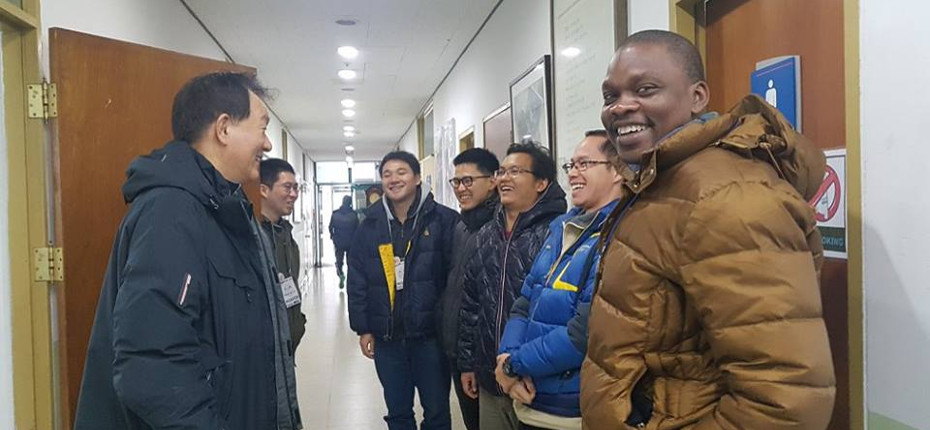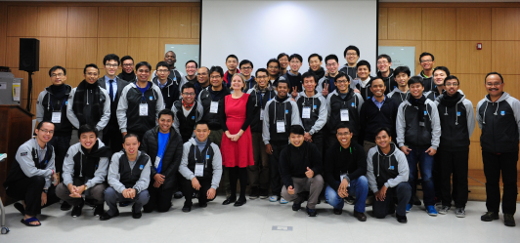 Barnabé Hounguevou is a scholastic from Benin, West Africa staying in Arrupe International Residence. He was one of 39 participants in the Scholastics and Brothers Circle Workshop held in Seoul, South Korea from December 19 to 28, 2016.
Barnabé Hounguevou is a scholastic from Benin, West Africa staying in Arrupe International Residence. He was one of 39 participants in the Scholastics and Brothers Circle Workshop held in Seoul, South Korea from December 19 to 28, 2016.
Bombarded constantly with news about the situation of migrants across the world, we can either take action or become so accustomed to such information that we fail to discover that beyond the news and statistics are truly human faces. The conditions of the migrants might remain far from us until we meet a migrant and this encounter transforms us. This has been my own story during the last Scholastics and Brothers Circle meeting, which was a veritable journey where I became aware of my own identity as a migrant and became more sensitive to the situation of the migrants.
Though the migrant workers I met during my exposure were “undocumented” and unable to project themselves in the future, I was struck by their great hope. Besides their difficulties which need to be addressed, the sharing of the migrants revealed to me their resilience, their aspirations for a better future and their hope. Listening to their stories has also helped me to become more aware that not only was I a “son of a migrant” but as a Jesuit on mission who has done all his training outside his country of birth, I am myself a migrant. A reality that I found distant was then closer to me, was part of my own story. This realisation has made me more compassionate towards the migrants and has even inspired me for my future ministry.
 If migrants are unwelcome in their host countries because of the fear of the local people of losing their jobs, security or identity, research as JCAP Migration Network Coordinator Fr Benny Juliawan SJ told us shows clearly that migration has many positive outcomes for both the host country (economic growth, cultural diversity) and the migrant’s country of origin (remittances, networks, new skills). Though as humans we share the aspirations of migrants for a better life, the policy of many nations is to close their doors to refugees. Quoting Zygmunt Bauman, Jesuit Refugee Service – Asia Pacific Director Fr Bambang Sipayung SJ explained that from a socio-philosophical perspective refugees are unwanted because they symbolise our own insecurity or fear. For Bauman, the new refugees are “people who yesterday were very proud of their home and position in society as we are today but who now are deprived of their homes, possession, security”. Instead of an attitude of fear and defensiveness, there is a need to promote dialogue and to build what Pope Francis calls a “culture of encounter in which we are not only prepared to give, but also to receive from others. Hospitality, in fact, grows from both giving and receiving.” Religions can help in building this “culture of encounter” and hospitality as I witnessed during the Christmas Eve celebration. Five brothers and I were invited to Holy Cross Anglican Church where Catholics, Anglicans and a Buddhist monk celebrated together the Nativity. They took turns to share their reflections about the Child Jesus. It was an example of true hospitality that is needed in a world where some migrants are discriminated against because of their religion.
If migrants are unwelcome in their host countries because of the fear of the local people of losing their jobs, security or identity, research as JCAP Migration Network Coordinator Fr Benny Juliawan SJ told us shows clearly that migration has many positive outcomes for both the host country (economic growth, cultural diversity) and the migrant’s country of origin (remittances, networks, new skills). Though as humans we share the aspirations of migrants for a better life, the policy of many nations is to close their doors to refugees. Quoting Zygmunt Bauman, Jesuit Refugee Service – Asia Pacific Director Fr Bambang Sipayung SJ explained that from a socio-philosophical perspective refugees are unwanted because they symbolise our own insecurity or fear. For Bauman, the new refugees are “people who yesterday were very proud of their home and position in society as we are today but who now are deprived of their homes, possession, security”. Instead of an attitude of fear and defensiveness, there is a need to promote dialogue and to build what Pope Francis calls a “culture of encounter in which we are not only prepared to give, but also to receive from others. Hospitality, in fact, grows from both giving and receiving.” Religions can help in building this “culture of encounter” and hospitality as I witnessed during the Christmas Eve celebration. Five brothers and I were invited to Holy Cross Anglican Church where Catholics, Anglicans and a Buddhist monk celebrated together the Nativity. They took turns to share their reflections about the Child Jesus. It was an example of true hospitality that is needed in a world where some migrants are discriminated against because of their religion.
Fr Se-il Oh SJ shared that migrants are people whose dignity and rights need to be protected. The sharing of Fr Isidore An SJ and Fr Denis Kim SJ reminded me of the richness of the Ignatian paradigm and the need to look upon migrants with God’s loving gaze. For Fr Kim, the JRS model which is to accompany, to serve and to advocate for refugees can serve as a migration ministry model, though there is a need to add another dimension which is that of research. Such a model which puts a special emphasis on “being-with rather than doing-for” seems to have proven its efficiency as revealed by the sharing of Ms Jane Williamson. A former member of JRS Cambodia, Jane stressed the benefit she gained from the years spent in JRS and the impact of this experience on her way of helping refugees today with UNHCR.
The presentation of the situation on each province has widened my understanding of the issue of migration. The exchanges have been very rich and each of us has learned a lot from the various situations and from the initiatives taken by the Society through the Jesuit Conference. This SBC meeting was also a time for building relationships among the 39 scholastics and brothers present and a promise of better cooperation and future networks across the Jesuit Conference of Asia Pacific and the whole Society.

